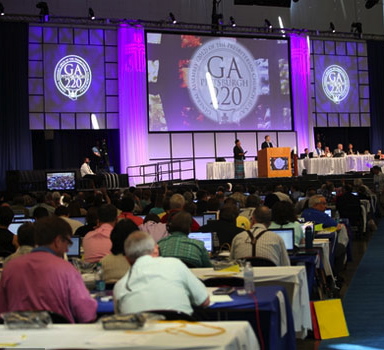Reflections on an Ethical Dilemma

Looking Back as We Prepare to Move Forward
As we approach the 221st General Assembly of the PC(USA), we prepare for a longstanding controversy to come back to the floor — divestment from Caterpillar because of its manufacture of bulldozers used to demolish homes in the Occupied Palestinian Territories. Many Presbyterians have favored such a move; it would be in accord with positions consistently taken by past General Assemblies. However, Presbyterians in Peoria, headquarters of Caterpillar, have steadfastly opposed any such action, for reasons that will probably be understandable.
This particular episode, then, illustrates a far more general question: How are we to react when the source of our own livelihood or assets is criticized and may be subjected to new financial pressures?
The Caterpillar Controversy
The Caterpillar issue was first raised at the 2004 General Assembly. The Assembly recognized the complexity of the issue and instructed the Committee on Mission Responsibility Through Investment (MRTI) to begin a process of “phased, selective divestment” related to corporations engaged in non-peaceful pursuits in Israel/Palestine. MRTI reviewed PC(USA) policy, looked at obstacles to just peace in Israel and Palestine, and identified companies whose goods or services were involved in violent acts, especially those that violated international law. They continued to contact these corporations through the years, directly as well as through shareholder resolutions, but with few indications that the corporations were willing to change their business practices. Caterpillar in particular has consistently denied any responsibility for the uses to which its products may be put.

In preparation for the 2012 Assembly, MRTI recommended that Caterpillar, Hewlett-Packard, and Motorola Solutions be placed on the divestment list until they cease profiting from non-peaceful pursuits in Israel-Palestine. This position was also approved by the General Assembly Mission Council (now the Presbyterian Mission Agency Board). The recommendation was then considered by the relevant GA committee, which approved it by a vote of 36 to 11.
But many other voices were raised, since the recommendation concerned not only Caterpillar but also the state of Israel and its policies in the Occupied Territories. A rabbi who had been invited to offer an ecumenical greeting used the occasion to deliver a seven-minute speech attacking divestment. Young members of Jewish Voice for Peace shared their reasons for supporting divestment. For many Presbyterians, political or religious support for Israel overrode other considerations. Others expressed concern not about the issue itself but about its divisiveness, especially when many congregations have left the PC(USA) for the Evangelical Presbyterian Church.
___________________________________________
MRTI continued to contact these corporations through the years, directly as well as through shareholder resolutions, but with few indications that the corporations were willing to change their business practices.
___________________________________________
And then there were the Presbyterians from Peoria, Illinois, headquarters of Caterpillar, which employs more than twice as many people as the next largest employer. A third of the members of one Peoria congregation are Caterpillar employees. Some have stopped making contributions. One commissioner from Peoria came into the plenary hall wearing Caterpillar gear. The Presbytery of Great Waters, whose headquarters are also in Peoria, has consistently opposed divestment; in 2006 the presbytery defended Caterpillar and asked the GA to rescind its 2004 action.
In the end, the GA voted down the divestment motion by a vote of 333 to 331, with two abstentions. Perhaps these numbers, coming after eight full years of study, dialogue, and controversy, give a reliable indication of the dissonance – or just plain fear – in the church today.
Private Prisons

There was similar dissonance, though to a lesser degree, over another issue – that of private, for-profit prisons. In 2003, the GA adopted a statement critical of such prisons and called for their abolition. The Corrections Corporation of America has been a leader in the field, and its headquarters are in Nashville. It so happened that John D. Ferguson, the president of CCA, had been a commissioner to the 1996 GA. Early in 2004, he wrote to Clifton Kirkpatrick, the Stated Clerk at the time, with a defense of private prisons as an important part of the correctional system. A copy was sent to the Rev. Todd Jones, pastor of the First Presbyterian Church, of which Ferguson was a member.
The same Todd Jones was a commissioner to the 2012 GA, which reaffirmed the 2003 statement opposing private prisons and encouraged divestment of holdings in such companies, and issue that will come before the 2014 Assembly. Though the motion passed in 2012, it is interesting to see that Rev. Todd Jones spoke against the action.
Smithfield Foods
Another example of conflicting interests was the controversy at the 2006 Assembly over the Smithfield Ham factory in Tar Heel, NC, the largest such factory in the world. The company had already been convicted of union busting and a string of Occupational Safety and Health Administration (OSHA) violations. It was also controversial because of its use of “gestation crates” for sows and the big, smelly waste lagoons near its farms.

Photo Credit: visitsmithfieldisleofwright.com
An overture came from New Hope Presbytery calling for Assembly action. It was narrowly approved in committee, but on the floor it was referred to ACSWP, on two grounds: Smithfield executives had come to the Assembly and assured the commissioners that all problems were being resolved; and the presbytery within which the factory lies (Coastal Carolina) had not joined in the overture. Perhaps it was easier to raise concerns when a presbytery was near enough to pay attention but was not directly affected by the controversy.
ACSWP, acting on its mandate from the Assembly, met with management, workers, the United Food and Commercial Workers union (which eventually won an election in 2009), and the two local presbyteries. The situation continues to be uncertain, especially with the rise of new controversies over immigrant workers and their legal status.
Klamath River Basin
The most unpredictable and perhaps most consequence-filled example of conflicting interests is, in my opinion, the 2001 Assembly’s adoption of a statement about that year’s drought in the Klamath River Basin, which straddles northern California and southern Oregon. Disputes were taking place over the allocation of water to meet the various and often conflicting needs of ranchers, salmon and other endangered species, and several federally recognized Indian tribes in the basin. At the start of the Assembly a Commissioner’s Resolution was filed by a woman from the region, a rancher’s wife with a Hispanic surname and a convincing way of addressing the committee and the plenary. There was not time for a thorough discussion, and she won what some might call the “sympathy vote.”

Photo Credit: waterwatch.org
A key sentence in the Assembly’s action asserted, “the taking of water rights is the taking of private property and that just compensation is due.”
However, a problem immediately arose. PC(USA) social witness policy is based on the latest statements by the General Assembly, but this statement was not in accord with the wide-ranging statement adopted by the 1990 GA, entitled Restoring Creation for Ecology and Justice, which dealt with the appropriate use of scarce resources and recommended sustainable policies, including the protection of wetlands. Furthermore, the statement adopted by the 2001 GA took a controversial position on property rights, takings, and compensation — a position that has not been accepted in courts of law and is not likely to be accepted. Government regulation of private property has not been held to be a “compensable taking” except under extreme conditions. Water in particular has been regarded as being under the jurisdiction of state or federal governments, and thus not a private right.
___________________________________________
These cases are quite varied, but what they have in common is a dissonance between the immediate self-interest of some Presbyterians and the ethical positions that the PC(USA) has taken about crucial issues in contemporary life.
___________________________________________
The issue thus needed further study, and after several years, ACSWP prepared an extensive paper outlining the issues and recommending that the 2004 GA rescind the troubling statement on water rights, takings, and compensation, on the grounds that it was not an appropriate time to try to resolve the complex and still undeveloped legal issues involved. The Assembly agreed.
Thinking About Self-Interest
These cases are quite varied, but what they have in common is a dissonance between the immediate self-interest of some Presbyterians and the ethical positions that the PC(USA) has taken about crucial issues in contemporary life.

Self-interest is not to be condemned out of hand. In the parable of the unjust steward (Lk. 16:1-9), Jesus praises the steward’s shrewdness in looking out for his own future and tells his disciples that they should be similarly shrewd in the world of mammon. Experience tells us that it is much easier to do what is right when it is compatible with our own interests. There is a legal tradition that corporate officers have a “fiduciary responsibility” to make decisions that will benefit their stockholders; analogously, individuals often tend to regard anything that is an “investment” (real estate, stocks, savings) as something that must increase in its market value, regardless of ethical or environmental considerations.
The Internal Revenue Code, while strictly limiting what a nonprofit corporation can do, does allow a nonprofit to engage in pro suo activities, defending its own interests. Religious denominations, quite predictably, supported the Religious Freedom Restoration Act of 1993 (RFRA), which gave what many regarded as excessive latitude in interpreting the “free exercise” clause of the First Amendment (In 1997 the Supreme Court itself struck down many features of RFRA, including its impossible requirement that government use the “least restrictive means” in regulating religious activities).
___________________________________________
Self-interest is not to be condemned out of hand…especially when the interests involved are not merely those of a single individual or corporation but of an entire community.
___________________________________________
Especially when the interests involved are not merely those of a single individual or corporation but of an entire community — its workers, their families, and their children — it seems quite legitimate to defend actions or policies that may be questioned on moral or environmental grounds. The complexity of the situation means that problems must be dealt with carefully in order to avoid harmful consequences to the community.

But of course self-interest is always open to suspicion and scrutiny. It can skew one’s perceptions of fact as well as theory and value. Jesus in the Sermon on the Mount cautions against seeking rewards and loving only those who love us. The Epistle of James warns local churches about welcoming the one who enters with gold rings and fine clothing but ignoring the poor (Jas. 2:1-7).
Sometimes the moral point becomes clear only at the end of a roundabout process. I think, for example, of when the prophet Nathan tells King David the story of the little lamb that the rich man expropriated to entertain a guest, and then, after David’s outburst of condemnation, applies it to David’s own expropriation of Bathsheba (2 Sam. 12:1-15). My hope is that Presbyterians who have a direct relation with controversial matters will, sooner or later, follow David’s example. I am sure that some people in these presbyteries have done exactly that. Some in the Presbytery of Living Waters doubtless raised the question how Caterpillar’s bulldozers were put to use, even as Caterpillar explicitly refused to take responsibility.
___________________________________________
Sometimes the moral point becomes clear only at the end of a roundabout process.
___________________________________________
What, then, are we to do when our own organizations, policies, or sources of income are questioned on moral or environmental grounds?

Self-justification is often the first reaction. But defense quickly becomes offense. To be sure, there is always a place for clarification of facts and reminders about the complexity of the situation; critics need to consider these complexities, too. But debate can quickly get out of hand. Ethical discussions within religious bodies can quickly begin to look like the fights between political parties during an election campaign. Is there another course of action?
Public officials are expected to avoid “even the appearance” of conflict of interest (the reality does not always meet this expectation, of course). This might be a useful rule of thumb when religious bodies are tempted to defend the controversial actions of companies or governments or individuals that are closely linked with them. As we recall the cases cited above, the contrasting responses of New Hope and Coastal Carolina presbyteries might be instructive. The inaction of Coastal Carolina could seem cowardly at first glance. But from another perspective, its inaction appears incredibly prudent, letting a neighboring presbytery with less direct involvement in the issue take the initiative.
___________________________________________
My hope is that Presbyterians who have a direct relation with controversial matters will, sooner or later, follow David’s example. I am sure that some people in these presbyteries have done exactly that.
___________________________________________
Both denunciation and defense can be necessary. But sometimes they are best carried out by a third party who is not immediately involved in the conflict and is in a position to explore the issues without having an immediate self-interest. To be sure, we are expected to think and act on our own responsibility. But in the Bible there is also a role for the advocate, different from the conflicting parties, and the advocate may be a much-needed comforter to the afflicted.
As we head toward this 221st General Assembly and revisit some of these issues (including Caterpillar Divestment and For-Profit Prisons), let us consider where our self-interests lie, where we are called to stand, and what role we are called to take. And may we let the Holy Spirit, the true Advocate lead the way.
*****
Read more articles from The Road to Detroit: Issues of Social Justice Before the 221st General Assembly.





Unbound Social